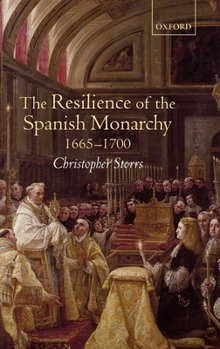The Resilience of the Spanish Monarchy 1665-1700
Christopher Storrs presents a fresh new appraisal of the reasons for the survival of Spain and its European and overseas empire under the last Spanish Habsburg, Carlos II (1665-1700). Hitherto it has been largely assumed that in the "Age of Louis XIV" Spain collapsed as a military, naval and imperial power, and only retained its empire because states which had hitherto opposed Spanish hegemony came to Carlos's aid. However, this view seriously underestimates the efforts of Carlos II and his ministers to raise men to fight in Spain's various armies--above all in Flanders, Lombardy, and Catalonia--and to ensure that Spain continued to have galleons in the Atlantic and galleys in the Mediterranean. These commitments were expensive, so that the fiscal pressures on Carlos' subjects to fund the empire continued to be considerable. Not surprisingly, these demands added to the political tensions in a reign in which the succession problem already generated difficulties. They also put pressure on an administrative structure which revealed some weaknesses but which also proved its worth in time of need. The burden of empire was still largely carried in Spain by Castile (assisted by the silver of the Indies), but Spain's ability to hang onto empire was also helped by a greater integration of centre and periphery, and by the contribution of the non-Castilian territories, notably Aragon in Spain and Naples in Spanish Italy. This book radically revises our understanding of the last decades of Habsburg Spain. As Storrs demonstrates, it was a state and society more clearly committed to the retention of empire - and more successful in achieving this--than historians have hitherto acknowledged.
Format:Hardcover
Language:English
ISBN:0199246378
ISBN13:9780199246373
Release Date:December 2006
Publisher:Oxford University Press, USA
Length:288 Pages
Weight:1.28 lbs.
Dimensions:0.9" x 6.4" x 9.5"
Related Subjects
HistoryCustomer Reviews
0 rating





